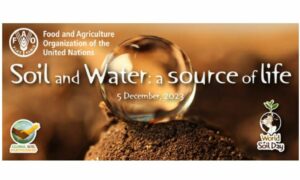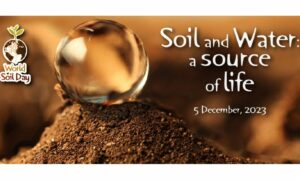Event World Day
World Soil Day 2023
World Soil Day 2023 (WSD) and its campaign aim to raise awareness of the importance and relationship between soil and water in achieving sustainable and resilient agrifood systems. WSD is a unique global platform that not only celebrates soils but also empowers and engages citizens around the world to improve soil health.
About
World Soil Day (WSD) is held annually on 5 December as a means to focus attention on the importance of healthy soil and to advocate for the sustainable management of soil resources. The establishment of an international day to celebrate soil was recommended by the International Union of Soil Sciences (IUSS) in 2002. After being endorsed at the FAO Conference in 2013, World Soil Day was formally recognized by the UN General Assembly.
2023 Theme – Soil and water, a source of life
Our planet’s survival depends on the precious link between soil and water. Over 95 percent of our food originates from these two fundamental resources. Soil water, vital for nutrient absorption by plants, binds our ecosystems together. This symbiotic relationship is the foundation of our agricultural systems.
However, in the face of climate change and human activity, our soils are being degraded, putting excessive pressure on our water resources. Erosion disrupts the natural balance, reducing water infiltration and availability for all forms of life.
Sustainable soil management practices, such as minimum tillage, crop rotation, organic matter addition, and cover cropping, improve soil health, reduce erosion and pollution, and enhance water infiltration and storage. These practices also preserve soil biodiversity, improve fertility, and contribute to carbon sequestration, playing a crucial role in the fight against climate change.
WSD 2023 Key Messages
📌 Soil and water are essential resources for sustaining life on Earth.
- Soil and water provide the foundation for food production, ecosystems, and human well-being. Recognizing their invaluable roles, we can take proactive measures to safeguard these resources for future generations.
- Soil erosion and compaction disrupt the capacity of soil to store, drain and filter water, and exacerbates the risk of flood, landslides and sand/dust storms.
- Soil and water are the medium in which plants grow and obtain essential nutrients.
- Healthy soil plays a crucial role as a natural filter, purifying and storing water as it infiltrates into the ground.
- Rainfed agriculture systems account for 80 percent of croplands, contributing to 60 percent of the global food production. These systems rely heavily on effective soil moisture management practices.
- Irrigated agriculture systems withdraw 70% of the world’s freshwater and account for 20 percent of croplands.
📌 Soil and water are interconnected resources that need integrated management.
- The health of the soil and the quality and availability of water are interconnected.
- Implementing sustainable soil management practices enhances water availability for agriculture. Healthy soils, enriched with organic matter, play a crucial role in regulating water retention and availability.
- Efficient use of quality water, promoting the sustainable use of fertilizers and pesticides, employing appropriate irrigation methods, improving drainage systems, controlling pumping, and monitoring soil and groundwater salinity levels are essential to maintaining sustainable agricultural practices.
- Sustainable soil management is key to improve water productivity in irrigated systems.
📌 Improper soil and water management practices affect soil erosion, soil biodiversity, soil fertility, and water quality and quantity.
- Water scarcity leads to the loss of soil biodiversity, while leaching and eutrophication from agriculture practices lead to the loss of biodiversity in water bodies.
- The mismanagement of pesticides and fertilizers not only threatens soil and water quality but also poses significant risks to human health and ecosystems.
- Poor irrigation and drainage practices are some of the main drivers of soil salinization.
- Rising sea levels contribute to land loss, increasing the risk of soil salinization and sodification, which can negatively impact agricultural productivity.
📌 Soil and water conservation contribute to climate change mitigation and adaptation.
- Improved soil and water management improves the land’s capacity to withstand extreme climate events such as droughts, floods and sand/dust storms.
- Integrated soil and water management practices provide essential ecosystem services, supporting life on earth and enhancing ecosystem resilience.
- Healthy soils act as a carbon sink, by sequestering carbon from the atmosphere, thus contributing to both climate change adaptation and mitigation efforts.
Soil and the Role of Geneva
In the face of the triple planetary crisis of climate change, biodiversity loss, and pollution, our soils are being degraded and polluted, putting excessive pressure on this precious resource and the food systems that depend on it. Learn more about these issues and the role of Geneva-based organizations to promote the sustainable management of soils towards a food-secure world and stable and sustainably used ecosystems.
More on Soils, Food and the Environment
Food is at the center of human lives, and so are the soils that support food systems. However, unsustainable food production and consumption practices have led to environmental degradation, including soil degradation, and exacerbated climate change. In return, food systems suffer from climate change, biodiversity loss and pollution.
Land and soil degradation pose a major threat to global food security and to the achievement of the Sustainable Development Goals (SDGs) – compromising the well-being of at least 3.2 billion people around the world. Loss of soil biodiversity, soil erosion, pollution and salinization are all critical issues that need to be addressed to ensure food security, livelihoods, and health for all.
As the leading organization on the issue, FAO provides numerous resources to better understand the role of soil and food systems for a sustainable future, as well as challenges and ways forward. From a Geneva perspective, our dedicated page provided useful resources on this nexus and the organizations in Geneva working on these issues. In light of recent international negotiations and debates on plastic pollution, the role of plastics in agriculture and the subsequent soil pollution has also been under focus. Find more information in our Plastics and the Environment series.
Events

World Soil Day Official Celebration
5 December 2023, 12:30 – 14:00 CET | Zoom
World Soil Day 2023 Contests
Photo Contest
FAO launched a photo contest open to all. Submitted photos should illustrate any of those aspects: promote environmental awareness; educate about soil and water issues, advocate sustainable practices, foster artistic expression and inspire action.
Submission and deadline
- Submission closes: 20 November 2023
- Shortlisting and public voting of the 10 best submissions: 27 November 2023*
- Announcement of the winner: 5 December 2023
*Shortlisted entries will be posted on social media accounts for the public voting.
Poster Contest
In the framework of World Soil Day 2023, FAO’s GSP is calling on children and teens, from ages 5 to 14, living all around the world, to use their imagination and create a poster by kids for kids that illustrates how healthy soil and clean water contribute to achieve sustainable and resilient agrifood systems. The contest should also help raise awareness on the importance of sustainable soil management. All young people who care about nature and soil and want to take part in this challenge are invited to participate. Schools and colleges around the world can also compete. The competition is divided into the following categories:
Category A | age range between 5-10 years old
Category B | age range between 10-14 years old
Submissions should be sent by 20 November 2023 by filling and submitting the Registration form .
Book Contest

FAO’s GSP and the IUSS are inviting soil scientists and designers to team up and submit their freestyle book proposal for children based on the WSD 2023 motto: “ Soil and water, a source of life ”. The IUSS and FAO’s GSP Selection Committee will evaluate all book submissions, and the winner will be announced by the IUSS President on World Soil Day. The book is intended for children between 6 and 11 years old and must feature at least one of the following elements:
- Convey scientific knowledge about healthy soil and clean water, emphasizing their key role in achieving sustainable and resilient agrifood systems for ensuring global food security;
- Highlight the relationship between soil health and clean water. Emphasize the importance of addressing the increasing challenges in soil management;
- Establish a clear link between soil and water and emphasize the need for their conservation, sustainable use, and management for present and future generations;
- Raise awareness on the importance and relationship between soil and water in achieving sustainable and resilient agrifood systems and the need to identify knowledge gaps and solutions for integrated management of soil and water resources in a changing environment.
Submissions should be sent by 20 November 2023 through any free file transfer service/platform (i.e. Google drive, Share drive, WeTransfer, Dropbox) to World-Soil-Day@fao.org .
Further News
- From the soil to the stars | FAO | 13 November 2023



